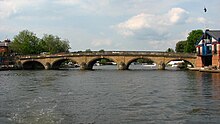The Boat Race 1829
| 1st Boat Race | |||
|---|---|---|---|

Henley Bridge, the finish of the 1st Boat Race
|
|||
| Date | 10 June 1829 | ||
| Winner | Oxford | ||
| Margin of victory | "easily" | ||
| Winning time | 14 minutes 30 seconds | ||
| Overall record (Cambridge–Oxford) |
0–1 | ||
| Umpire | Cyril Page (Oxford) John Stuart Roupell (Cambridge) |
||
|
|||
The 1st Boat Race took place at Henley-on-Thames on 10 June 1829. The race came about following a challenge laid down to the University of Oxford by University of Cambridge "to row a match at or near London, each in an eight-oared boat during the ensuing Easter vacation". Oxford wore dark blue jerseys while Cambridge wore "white with pink waistbands". In front of a crowd estimated to be around 20,000, and according to the official record, Oxford won the race "easily" in a time of 14 minutes 30 seconds. The Boat Race became an annual fixture, and as of 2015, has been contested 161 times.
Coxed eight rowing had been popular at the University of Oxford for a number of years before a club was established at the University of Cambridge around 1827. At a meeting of the Cambridge University Boat Club in February 1829, it was decided to challenge Oxford "to row a match at or near London, each in an eight-oared boat during the ensuing Easter vacation". The race was deferred to the summer, as rowing did not start at Oxford until after Easter, and scheduled for 10 June 1829 for a prize of 500 guineas. During the pre-race betting, Cambridge were the favourites to win the race.
Oxford wore a dark blue check outfit for the race, while Cambridge wore white with pink waistbands. The two boats were said to be "very handsome, and wrought in a superior style of workmanship" by The Morning Post; Oxford's green boat was built by Stephen Davies and Isaac King of Oxford, and was slightly the shorter, measuring 44 feet (13 m). Cambridge's pink boat was 18 inches (0.46 m) longer, and built by Searle of Westminster. The umpires for the race were Mr. Cyril Page (for Oxford) and Mr John Stuart Roupell (for Cambridge). Should the umpires disagree about any aspect of the race, they had recourse to consult the referee, whose name was not recorded.
The Cambridge crew weighed an average of 11 st 1.75 lb (70.5 kg); as the records for the Oxford crew are incomplete, no average weight can be calculated.
...
Wikipedia
